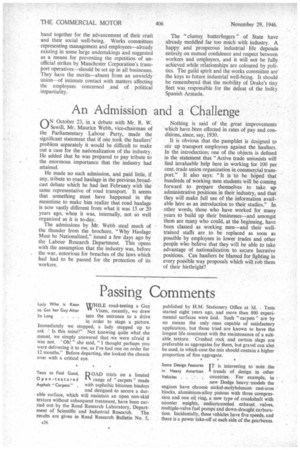An Admission and a Challenge
Page 28

If you've noticed an error in this article please click here to report it so we can fix it.
("NN October 23, in a debate with Mr. R. W.
Sewill, Mr. Maurice Webb, vice-chairman of the Parliamentary Labour Party, made the significant statement that if one took the hauliers' problem separately it would be difficult to make out a case for the nationalization of the industry. He added that he was prepared to pay tribute to the enormous importance that the industry had attained.
He made no such admission, and paid little, if any, tribute to road haulage in the previous broadcast debate which he had last February with the same representative of road transport. It seems that something must have happened in the meantime to make him realize that road haulage is now vastly different from what it was 15 or 20 years ago, when it was, internally, not so well organized as it is to-day.
The admissions by Mr. Webb steal much of the thunder from the brochure, "Why Haulage Must be Nationalized," issued a few days ago by the Labour Research Department. This opens with the assumption that the industry was, before the war, notorious for breaches of the laws which had had to be passed for the protection of its workers. Nothing is said of the great improvements which have been effected in rates of pay and conditions, since, say, 1930.
It is obvious that the pamphlet is designed to stir up transport employees against the hauliers. In the introduction, one of the objects is defined in the statement that "Active trade unionists will find invaluable help here in working for 100 per cent. trade union organization in commercial transport." It also says: "It is to be hoped that hundreds of working men students will be coming forward to prepare themselves to take up administrative positions in their industry, and that they will make full use of the information available here as an introduction to their studies." In other words, those who have worked for many years to build up their businesses—and amongst them are many who could, at the beginning, have been classed as working men—and their welltrained staffs are to be replaced as soon as possible by employees in lower trades and other people who believe that they will be able to take advantage of nationalization to secure lucrative positions. Can hauliers be blamed for fighting in every possible way proposals which will rob them of their birthright?
























































































